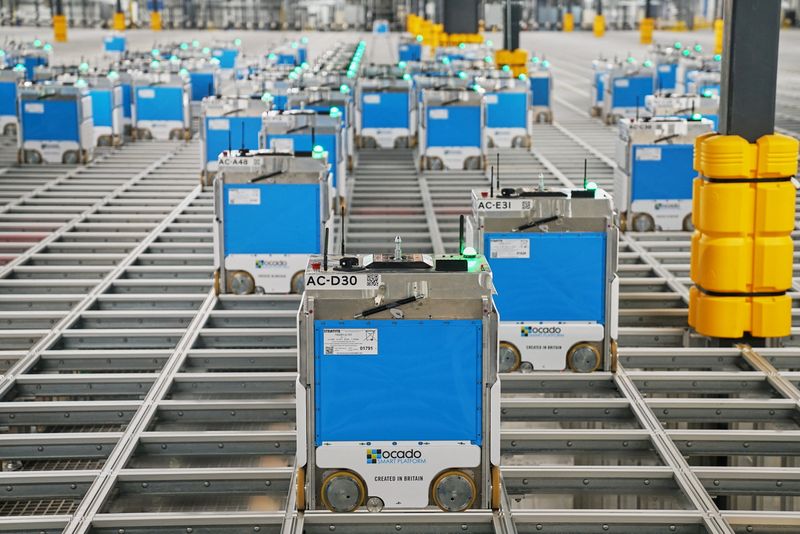Ocado’s robotic future under threat as Kroger looks to Instacart
By James Davey
LONDON (Reuters) -U.S. retailer Kroger’s decision to close three of the eight automated warehouses it built with Ocado and expand its ties with the likes of Instacart and DoorDash highlights the challenge the British firm faces from rapid delivery firms.
Ocado sells its cutting-edge technology to retailers like Kroger, allowing them to pick and dispatch online food orders from vast robotic warehouses.
But Kroger said on Tuesday that three of the warehouses had not met financial expectations, and that it would look to expand tie-ups with companies that not only offer faster deliveries but can be supplied from existing stores, thereby reducing costs.
“Consumers really want items that they’re ordering online to be delivered same day, and if possible, they would like to get them in an hour or two, if not sooner,” said Evercore analyst Michael Montani.
SAME-DAY CONVENIENCE
Ocado has seen its market value and revenues overtaken by DoorDash and Instacart operator Maplebear Inc in recent years, despite having had a head start on both.
While the British firm’s shares slumped this week, Instacart’s rose 5% on the back of last week’s better-than-expected third quarter results, and are up over a third since its 2023 listing. DoorDash shares are up 21% this year.
Montani noted that some of Ocado’s automated U.S. plants were in areas where Kroger didn’t have a big store presence, making it harder to get a foothold. Others in states like Ohio had done better.
“Retailers are going to be doing more automation. It’s just that they’re trying to strike the right balance of speed of delivery so they can give that same day convenience, but then also get the efficiency gains of doing automation.”
Britain’s largest food retailers Tesco and Sainsbury’s have largely eschewed automated warehouses for their e-commerce services, preferring a store-pick model that has still allowed them to offer rapid deliveries.
OCADO’S RISE AND FALL
In 2018, Ocado targeted 20 automated sites with Kroger, which helped to propel its market value during the home-shopping boom of the COVID pandemic briefly above that of UK industry leader Tesco. Since then, its shares have lost 90% of their value and are down over a third this year.
The setback with Kroger could put a question mark over Ocado’s ability to pick up more business from existing clients, and the potential for new tie-ups. The firm works with partners including Aeon in Japan, Lotte Shopping in South Korea and Coles in Australia.



Leave a Comment
Your email address will not be published. Required fields are marked *